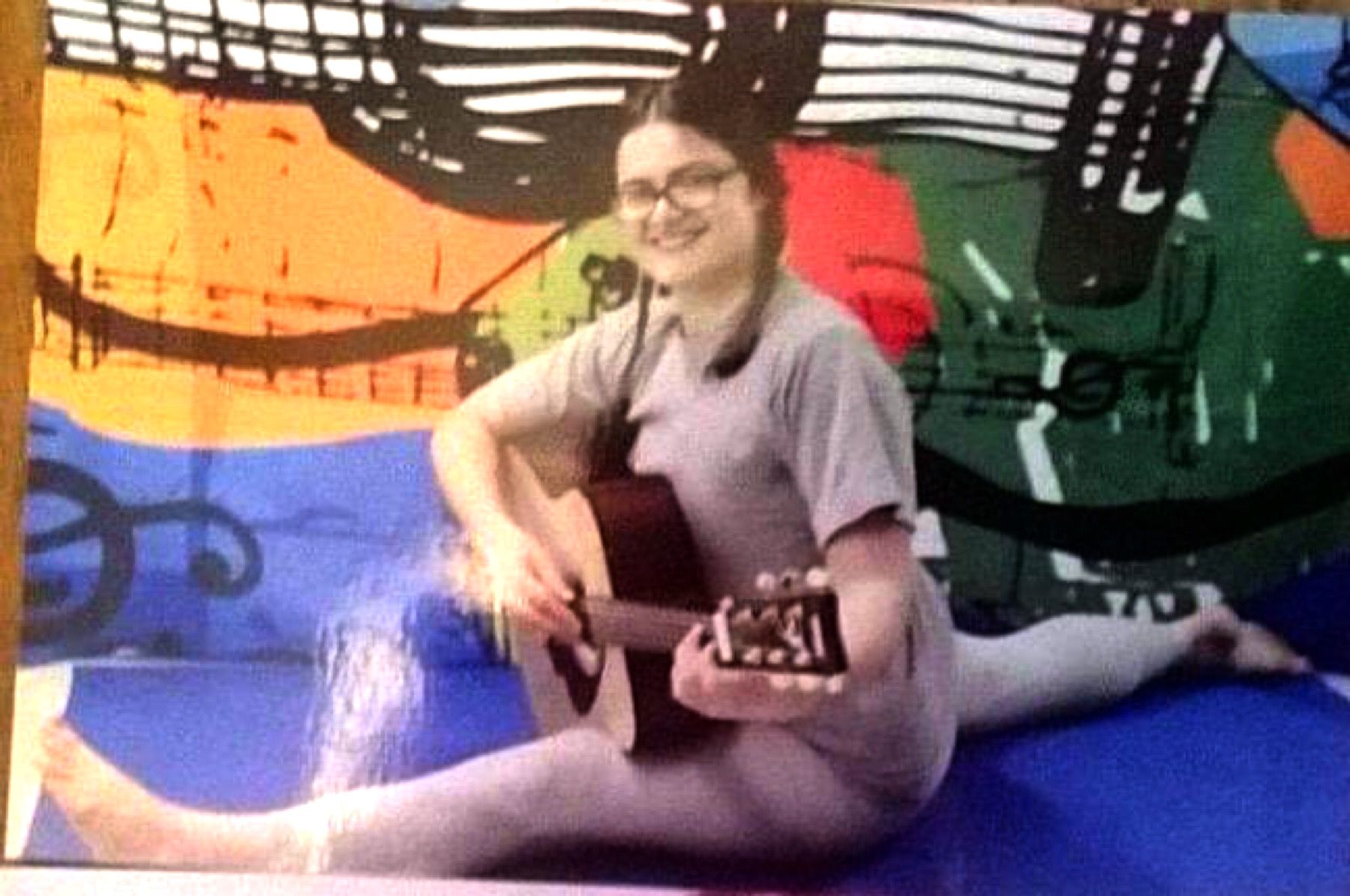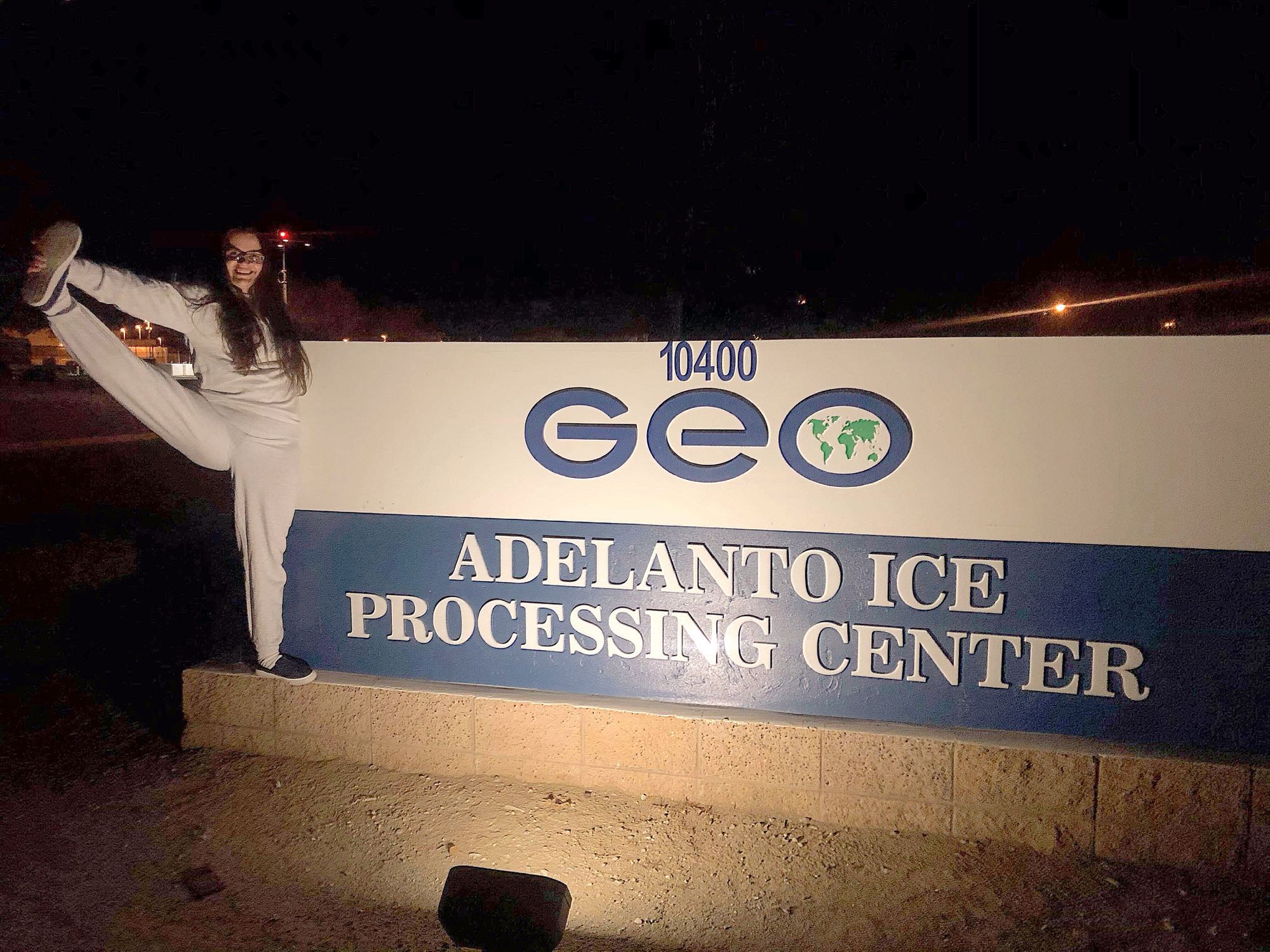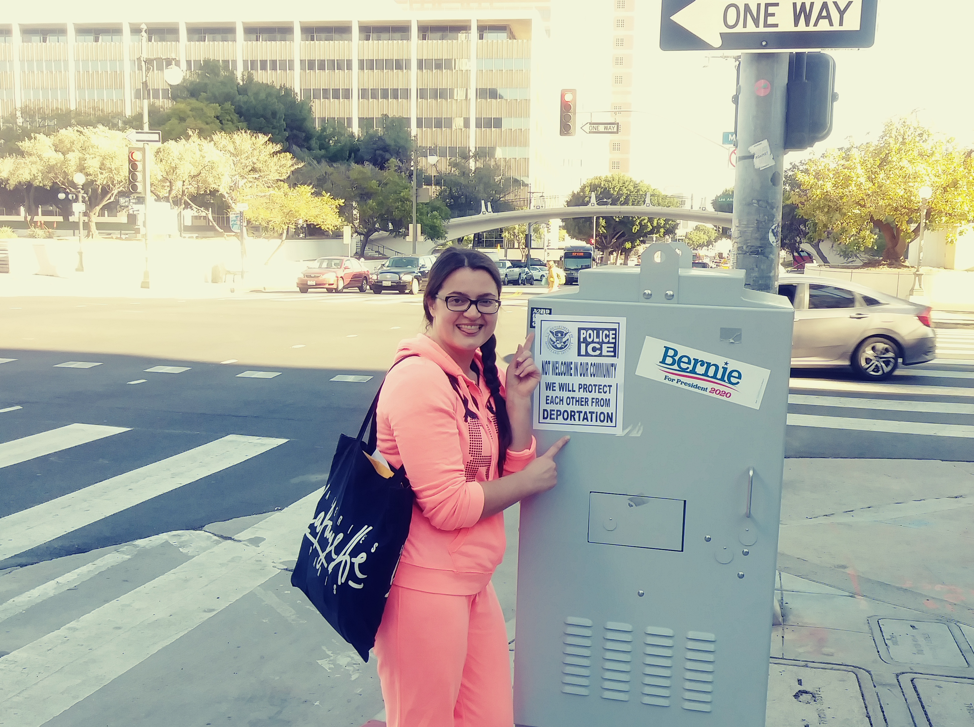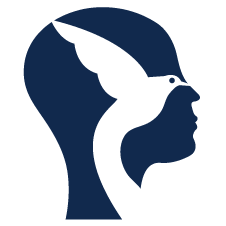by "Russian Anna"
I came to the US from Russia in June of 2008 on a J1 visa for students. I am half-Jewish and a lot of terrible things happened to me in Russia and authorities did not do anything to try to help me. In the summer of 2000, I was shot in the hand and knee outside a restaurant, then I was raped in 2004. I went to the police both times. They didn’t do anything. They didn’t even investigate.

This is the beginning of the story of how I came to the US, became a victim of domestic violence, was arrested and incarcerated for unwittingly being drawn into an illegal operation, was then transferred by ICE to immigration detention where I spent two years – and was finally, just this month, released on a withholding of removal.
While still in Russia, I was introduced by a friend to a Russian man living in Los Angeles. He helped me to prepare for the interview in the embassy so I would get a visa I needed to come to the US.
When I first arrived in here, my friend was already working in New York. After a couple weeks she suggested we go to LA to visit the Russian man, who’d offered to show us around. I stayed there for a month, but after a while we just started staying at home all the time, so I finally flew back to New York.
I helped take care of his house and his wife, and very quickly he became abusive – verbally, physically and sexually.
I was working as a waitress until my visa expired, in September of 2008. I told the Russian man about what happened to me in Russia and he said I can easily get asylum based on that and promised to help me apply for asylum and my sister sent money to him. He told me to just go back to California and stay with them and help around the house while my papers are being processed. I helped take care of his house and his wife, and very quickly he became abusive – verbally, physically and sexually. Unfortunately, domestic violence is very common in Russia and since my mom used to hit me, and that now he was doing it to his wife and me – I didn't even know what to do. I still believed he would help me with my application for asylum, even as the years continued to pass. “Just wait,” he kept telling me when I asked. “Be patient. It’s better to not rock the boat.”
Eventually, I started helping him with his work. He asked me to type letters to his clients, and gave me documents to send to them using my email address.
Eight and a half years after I moved to California, in 2016, he was arrested, and so was I for emailing fake documents he had filed for his clients.
My federal attorney asked me why I was involved in the crime and I told her that I was forced to do it.
My federal attorney asked me why I was involved in the crime and I told her that I was forced to do it. She wanted to know more but I felt bad speaking ill of the Russian man. It was only after she assured me a few times that whatever I told her would not affect his case unless I file criminal charges against him that I told my federal attorney more about what he was doing to me for years. She arranged to have a psychologist come evaluate me. We talked for more than 10 hours, and she wrote an 18-page report about everything that had happened to me. My attorney gave the report to the prosecutor, who said they would be willing to dismiss the charges if I did a year of a Conviction and Sentence Alternatives program for survivors of domestic violence. In order to get enrolled into this program you need to be outside and not incarcerated. My federal attorney contacted an immigration attorney and, after filing a request, a letter came back from USCIS that they don't have a file with my name. The Russian man never actually filed for my asylum. So I got the documents together and with help from my federal attorney filed it myself. I got a receipt from DHS stating that they received my asylum application and I can stay in the country until they make the decision on my case. Now that I had legal status I could request bond. I was released on bond and we went to see the judge to get approval for the program.
But when I appeared before the judge, he denied the program, and sentenced me to 16 months in prison instead. I had to go back to Metropolitan Detention Center (MDC) and finish my time.
In February of 2018, instead of being released, I was handed directly over to ICE and taken to Adelanto.
In February of 2018, instead of being released, I was handed directly over to ICE and taken to Adelanto. All this time, I didn’t have anything. The Russian man had never paid me so I could not afford to hire an immigration attorney.
My asylum application was denied, and I appealed to the Board of Immigration Appeals. By this time the organization Freedom for Immigrants had found a lawyer who agreed to look at my brief and after my appeal was sent back to the judge he agreed to take my case pro bono. When we saw another immigration judge she denied my relief too. We appealed again. And again BIA ruled that the judge was wrong and sent my case to see the judge again. We saw yet another judge for the 3rd time and he set a new date for an individual hearing. Sadly, my attorney Jorge Cabrera passed away from a heart attack, which was devastating because I loved him a lot and he was such an amazing person.
I learned a lot about immigration law while I was in detention, and actually helped a girl avoid deportation. When she found a lawyer, Hari, who was representing her and he asked her who helped her with the appeal papers and learned it was me he said he wanted to represent me for free. And after my lawyer Jorge died, he started to represent me.
I was detained in Adelanto for two years, from February 2018 to February of this year.

Let’s talk about the issues most commonly described there.
The first is medical. Sometimes it takes months or even longer to see an actual doctor. There is no privacy in the bathroom – there’s just a tiny curtain that covers you from your knees to your chest when you are sitting down, and so a lot of women suffer from constipation. But when they send a sick call to medical requesting help, they’re told to just exercise more and drink more water.
I wrote grievances and complaints in order to see a doctor, but was ignored for days.
I suffered a concussion when another detainee landed on my head after jumping down from her bunk. My body began to shake, and I eventually went into shock. Medical had to call an ambulance that came and took me to the hospital. But when I got back to Adelanto, I kept shaking, and feeling sick and dizzy. I wrote grievances and complaints in order to see a doctor, but was ignored for days. When I finally saw the doctor, she said “Oh, you’re taking Ibuprofen – you should be fine. Good luck!” When I filed a grievance complaining about the lack of medical attention, I was told that her telling me "good luck" was my misinterpretation.
The showers at Adelanto are not equipped for people with disabilities. Even though one has a bench, I couldn’t push the buttons because of how weak I felt. And so I couldn’t shower for 10 days.
Given that Adelanto is privately run, you’d think that the medical staff’s attitude would be more compassionate than in other places, but in fact it wasn't always the case. The exception was my psychologist, Dr. Deulen. He was one of three psychologists they have for almost 2,000 people, and he spent hours and hours providing us with support. It’s mostly thanks to him that I was able to maintain my sanity, especially when I was dealing with my concussion.
While at MDC I went to a lot of classes to learn how to assert myself, and to understand the effects of domestic violence on victims. I realized the Russian man had controlled me completely, psychologically and physically, financially and in numerous other ways as well.
On January 29th, a judge issued his written decision on my case and I was granted a withholding of removal. I was released on February 4th.
That morning, an ICE officer had me sign an order of supervision. He warned me that if I had any negative interactions with the police, I’d be brought back to Adelanto. I went to church and was happy to share my testimony about how God helped me through my journey in Adelanto. When I was called to roll up my bed and said goodbyes to my friends I was taken to intake, where I spent hours waiting to get released. Finally, at 6:30, I was released.
A friend met me, with her daughter. I started crying. She got me fish tacos, then she took me to her home, in Corona. Another friend from Nashville came, and a CLUE volunteer Juan Carlos drove me to Venice, where I was staying with a wonderful and loving woman, Donna, and her husband.

It still feels surreal to be out. I spend a lot of time going to social services. The process of applying for various documents and services takes forever, and they keep sending you to different offices. It’s crazy and overwhelming. I need to be driven everywhere, and I’m lucky and blessed to have all these people helping me, because I don’t know how I would have done anything on my own.
I see flowers, and they’re blooming and I stop to smell them, because I was living in the desert, in Adelanto, where there weren’t any flowers. And they smell so beautiful...
There are two things I really want to do. One is to teach yoga, because I know from my personal experience that it improves people’s lives both physically and mentally. I taught yoga to other girls on the soccer field at Adelanto using gestures because so many of them didn’t understand English. I would love to become a certified yoga instructor.
The second thing I became passionate about while detained at Adelanto is immigration law. I know it will take years and cost a lot of money, but I want to go to law school and earn my degree. I had four different lawyers, and they believed I could become one too, that I have the brains for it, even though all I did was try my best to learn what I could while I was inside.
I learned how to be happy even in those restrictive walls of Adelanto.
Despite being in detention center for 2 years I managed to use this time to work on myself and grow spiritually, intellectually, psychologically. I met wonderful women from all around the world and now have quite a few good friends. I met an amazing therapist who was selflessly and tirelessly helping me deal with all kinds of issues and who taught me a lot about myself. I found how my love to help people and my experience can be used by serving people in a positive manner and I loved doing that while I was there. I learned how to be happy even in those restrictive walls of Adelanto. And now my future looks bright with purpose and hope in it.
God bless all the women and men suffering in all corners of the world and I hope that my story will give hope and joy to those that need that in their lives, and shows that everything is possible with determination and hard work and an open mind.
Love,
"Russian Anna"

